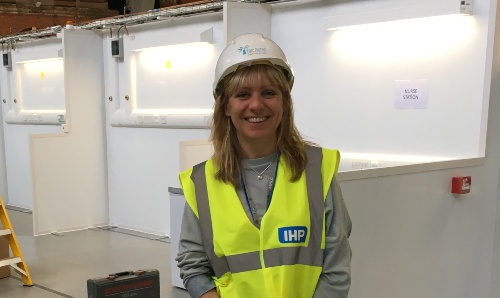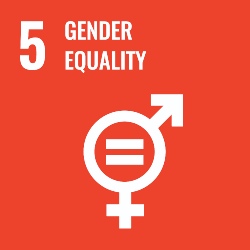
Ethics and social inequalities: how a Manchester clinician is tackling issues raised by COVID-19
The COVID-19 pandemic has put health inequalities in stark focus. Working at the NHS Nightingale Hospital North West, one senior practitioner based at The University of Manchester has had a fundamental role in tackling the immediate impacts of the virus while also examining our response as a society.
In early April, Dr Ruth Bromley, a practising GP and a senior lecturer at The University of Manchester, was deployed to NHS Nightingale Hospital North West, a 650-bed temporary facility treating patients with coronavirus who were still recovering after spending time in Intensive Care Units (ICU). This was one of a number of facilities nationwide to prevent the NHS being overwhelmed.
Along with her chief officer, Dr Bromley worked at the hospital in central Manchester during the coronavirus peak and established the care for dying pathways while maintaining her leadership role.
“I’m sure it’s been the same for everybody in different ways but it’s hard to believe what normal life was like back in February,” says Dr Bromley.
“As we had been monitoring the international spread of COVID-19, Manchester rapidly went into incident management planning mode in mid-March. Within ten days, we were in complete lockdown.”
Round-the-clock support for frontline workers

As well as her role as the Lead for Ethics and Law in the University’s Faculty of Biology, Medicine and Health, Dr Bromley is one of the most senior NHS practitioners in the city. She’s the Chair of Manchester Health and Care Commissioning, a partnership between Manchester City Council and NHS Manchester Clinical Commissioning Group.
As numbers of coronavirus patients and deaths started to increase in Manchester, Dr Bromley established 24-hour medical ethics support for GPs and NHS colleagues, both across the city and at the Nightingale Hospital.
This landmark move influenced a change in policy to allow patients to be with loved ones at the end of their life.
Dr Bromley says: “I lead a team of clinical ethicists and it was clear at the start of the pandemic that there could be difficult ethical decisions that frontline staff would need to make in real time. Decisions such as: who would get an intensive-care unit bed; care planning for people and patients in the community; facing the possibility of not working with adequate PPE, putting our lives at risk as frontline staff and risking the lives of relatives at home; not having access to usual services for patients who had illnesses other than COVID-19. We wanted to make sure that our colleagues felt able to acknowledge their moral distress and to be able to ask for help.”
Supporting the emotional recovery
Dr Bromley explains that the emotional recovery of staff and the support they needed was consistently discussed across the city region and implemented quickly.
“We worked closely with Etihad Campus to transform the football stadium to provide space for 26,000 frontline workers; train more than 350 nurses; establish a rest, relaxation and exercise centre for NHS and social care staff; and set up a drive-through testing facility in one of the Club’s car parks.
“Recruiting staff to get support in place for NHS staff and emotional support was centre stage at the Nightingale Hospital. Senior leaders talked explicitly about how difficult the work environment might become and what might be needed in order to mitigate the impact of this. In the end, we were blessed to work with an amazing team.
“Emotional support remains high on the agenda and we are working to put long-term strategies in place. This pandemic has been unprecedented for our lifetime and, unfortunately, one of the biggest risks and tragedies is that some colleagues might feel unable to continue to work in the NHS due to the trauma they have experienced. It is completely understandable if this happens but we hope we can keep this to a minimum.”
Changes to primary and secondary care provision
The pandemic created a large-scale digital transformation opportunity in primary care, enabling the NHS to respond to 24-hour calls across the country.
“Virtually overnight, we went from welcoming patients through the front door to operating a system of digital video consultation first, which is what Greater Manchester was aiming towards over the coming 18 months,” says Dr Bromley.
“The transformation happened overnight because it had to, and I’ve nothing but praise for our GP practices, local communities and neighbourhoods quickly pulling together.
“Business as usual was fundamentally suspended in secondary care. For example, in order to prevent patients sitting in busy waiting rooms for long periods of time, we have needed to look at carrying out investigations and reviews without people having to physically attend hospital appointments.
“Manchester is a very deprived city and we appreciate that not everyone has access to digital support.
“Meeting this need is high on our list of priorities. For example, working with the Mayor of Greater Manchester, commissioners and city-wide colleagues, we’re investigating ways to introduce digital access in homeless shelters to grant homeless people access to NHS services without having to register at a GP practice in person, which can be problematic. This will be an opportunity to reduce digital and health inequalities and support vulnerable groups.”
Intersectionality and health inequalities
In 2010, the Marmot Review identified areas across the UK that had poor health and inequalities impacting not only on the lives of thousands of residents, but also on the development of the city region as a whole. Manchester was one of the areas highlighted.
That’s why the region’s leaders are keen that all recovery plans enable the city to put those with the greatest need at the centre.
Dr Bromley says: “Since becoming Chair at Manchester Health and Care Commissioning, I’ve been working on ‘Commissioning with Kindness’, which is about intersectionality and health inequalities. We thought about the experiences of our Black, Asian, and Minority Ethnic (BAME) communities, our LGBT communities and the compounded impact of socioeconomic deprivation.
“Structural inequalities in society have really come to the fore as a result of COVID-19, not least because of the concern for our BAME colleagues on the frontline and the increased death rate from coronavirus.
“If there can be one positive legacy from COVID-19, it’s that we genuinely acknowledge the impact that any form of inequality has on people's life prospects and life expectancy and reform our services to address this.
“We have also detailed a five-year ‘Health Inequalities Strategy’ within the University’s medical school, that will embed learning about health inequalities, specifically in relation to the population health needs of our communities here in Manchester and across the Greater Manchester region.”
Wider impacts
Dr Bromley has observed wide-ranging, sometimes “catastrophic” impacts of the disease beyond its effects on patients.
“There are concerns about the collateral damage and the burden on health that we might see as a result of coronavirus, not as a direct result of someone having had it. In the first month, there was a massive drop in people presenting with other health issues, such as suspected cancer, for a number of reasons,” she explains.
“In my capacity as a GP, I’ve seen a rise in mental health impact on some of the families that have been housebound, which might be worse than it is for people who have been busy or had a sense of purpose.
“I’m also part of the Children and Young People's Recovery Plan. There were and continue to be major concerns for vulnerable children being subjected to abuse and having exposure to domestic violence.
“Devolution has ensured Greater Manchester has a good, cohesive plan that could be put in place, but having access to children in vulnerable positions hasn’t always been possible due to school closures.”
A moment to reflect
Amid such testing times, Dr Bromley has found strength in the fact that she has been so fundamentally involved in Manchester’s collective response from the outset.
“What I’ve drawn upon is the passion I have for my city, knowing what my responsibilities were and seeing my position as an NHS leader as a privilege,” she says.
“It’s made me really appreciative of the good support network I have around me, and it has mattered to me that other senior leaders and colleagues across the region have been able to access similar support in return.”

